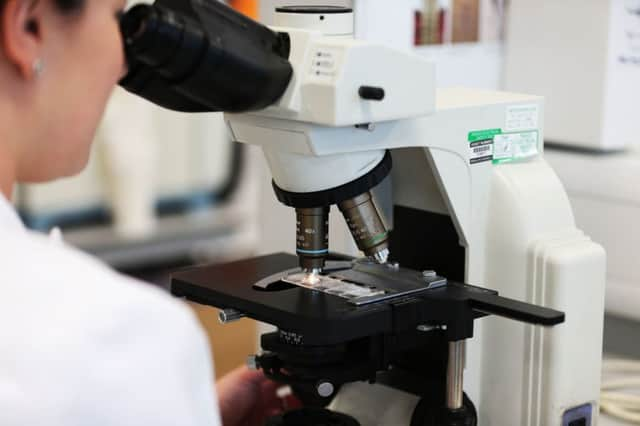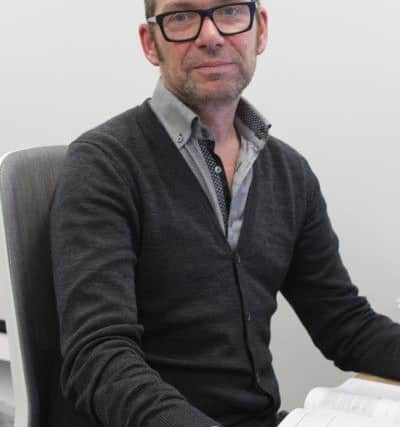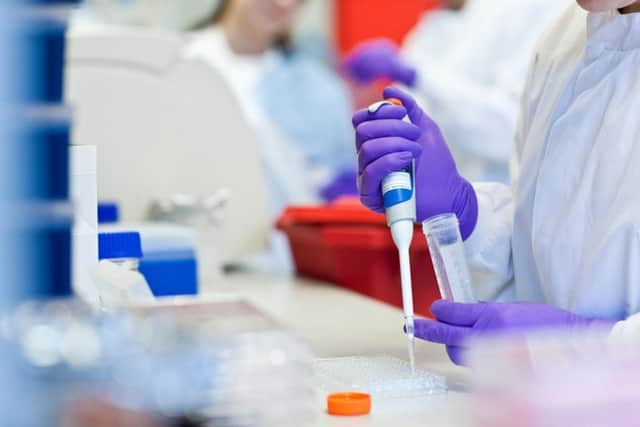The Yorkshire researchers helping GPs diagnose cancer


It’s a scenario which is played out in doctors surgeries up and down the country each day. A patient arrives complaining abdominal pain. There is no obvious cause and after answering a succession of questions and undergoing a series of checks they are sent home and told to come back if the pain doesn’t get any better.
A week or two later they are back and often after numerous repeat visits, they are referred to their local hospital for further tests. Eventually - and some months after that first GP appointment - they are diagnosed with cancer.
Advertisement
Hide AdAdvertisement
Hide Ad“At the moment many people are referred at the earliest opportunity, the diagnosis is quick and the treatment plan kicks in, but it isn’t always the case,” says Professor Richard Neal from the University of Leeds, who has just been awarded £5m from Cancer Research UK to improve the early detection of cancers in GP surgeries.


“I’m a GP myself and I know how difficult diagnosing cancer can be, and I am also aware of the difficulties that some patients have in getting a prompt diagnosis. The fact is that some cancers are simply harder to detect than others and there is no simple rulebook that GPs can refer to.
“The vast majority of people with breast cancer will present a fairly obvious lump, but that’s not true of every case and the hope is that we can give doctors a better set of tools so that they can quickly pinpoint these hard to detect cancers.”
The CanTest project is being funded through Cancer Research UK’s Catalyst Award scheme which in the charity’s own words was set up “to help research deliver trailblazing progress in their field which has long-lasting results”. Thanks to the money, Prof Neal will spend the next five years focusing on typically hard to diagnose cancers, including brain cancer, pancreatic cancer and myeloma and will look at both developing new tests and moving existing diagnostics from a hospital setting into GP surgeries.
Advertisement
Hide AdAdvertisement
Hide Ad“Our research will have patients at its heart,” he says. “Cancer diagnosis needs to be improved and new and better testing is central to this. Diagnostic tools are developing all the time and we will be looking at a range of new tests which involve analysing blood, exhaled breath as well as genetics.


“However, I am very aware that every other week there is a news story about some new test which is billed as revolutionising cancer diagnosis and it is important to realise that it is still very early days for this project.”
Just yesterday a report published in the Journal of Clinical Oncology claimed a blood test every four months could help the early detection of tumours in women at high-risk of ovarian cancer and earlier this month it was reported that a one-off screening test being introduced across the NHS hopes to cut the risk of men developing bowel cancer by a third.
Prof Neal, who spends one day a week practicing as a GP and the rest on research, is now in the process of recruiting three researchers to join his CanTest team in Leeds and there will be a further 16 researchers based worldwide.
Advertisement
Hide AdAdvertisement
Hide Ad“I found out our bid had been successful just before Christmas, but had to keep it a secret until now,” he says. “This is a truly global project and while the development of new tests is an exciting prospect, the other side of the research is looking at how we can better use existing diagnostics.


“There is no reason why GPs, who are properly trained, couldn’t use hand held ultra-sound devices or dermoscopy equipment which is used in skin analysis. As well as identifying those patients who need to be referred to a specialist at the earliest opportunity, on the flip side if those tests result are negative it also avoids the inevitable wait for a hospital appointment and alleviates pressure on the NHS.”
As well as Prof Neal at Leeds University, CanTest will involve researchers based at the University of Cambridge, the University of Exeter, UCL and University College London as well as a number of international institutions.
In addition to GPs, CanTest will help build a community of scientists and clinicians for diagnostic research, helping place the UK at the forefront of developing and implementing new cancer tests for GPs surgeries. To build the research community, an International School for Cancer Detection Research in Primary Care, which will be set up to train and support a new generation of scientists seeking to make the leap into this field.
Advertisement
Hide AdAdvertisement
Hide Ad“People are at the heart of delivering pioneering research and that is what CanTest is all about,” says Dr Fiona Walter, a lead researcher from the University of Cambridge. “We want to nurture a new generation of researchers from a variety of backgrounds to work in primary care cancer diagnostics, creating an educational ‘melting pot’ to rapidly expand the field internationally.”


According to Cancer Research UK, rates of the disease will climb nearly six times faster in women than in men over the next 20 years. The four most common cancer types are breast, prostate, lung and bowel and the charity has projected that UK cancer rates will increase by around half a per cent for men and by around three per cent for women.
This will mean that by 2035 an estimated 4.5m women and 4.8m men will be diagnosed with cancer in the 20 year period
Smoking and obesity are part of the reason for the faster rising rates for women as several of the obesity-related cancer types only affect women. The latest figures also showed the global burden of cancer has reached an estimated 7.4m men and an estimated 6.7 m women being diagnosed worldwide each year.
Advertisement
Hide AdAdvertisement
Hide Ad“The latest figures show that more than eight million people die from cancer each year across the world and reveal the huge challenge we continue to face, both in the UK and worldwide,” says ” says Sir Harpal Kumar, Cancer Research UK’s chief executive. “More people die from cancer than AIDS, malaria and tuberculosis put together.
“With more investment into research, we hope to make big improvements over the next 20 years in diagnosing the disease earlier and improving and developing treatments so that by 2034, three in four people will survive their disease.”
“Research is at the heart of finding ways to reduce cancer’s burden and ensure more people survive, particularly for hard-to-treat cancers where the outlook for patients is still bleak. We need to keep working hard to reduce the devastating impact cancer can have on so many families.
“This collaboration with CanTest will help is discover new and more effective ways to diagnose cancer by applying different methods to GP surgeries and finding out what really works on the job. By investing in future experts in the field, it has the potential not only to save GP’s and patients time, but also reduce the inevitably anxiety of waiting for results.”